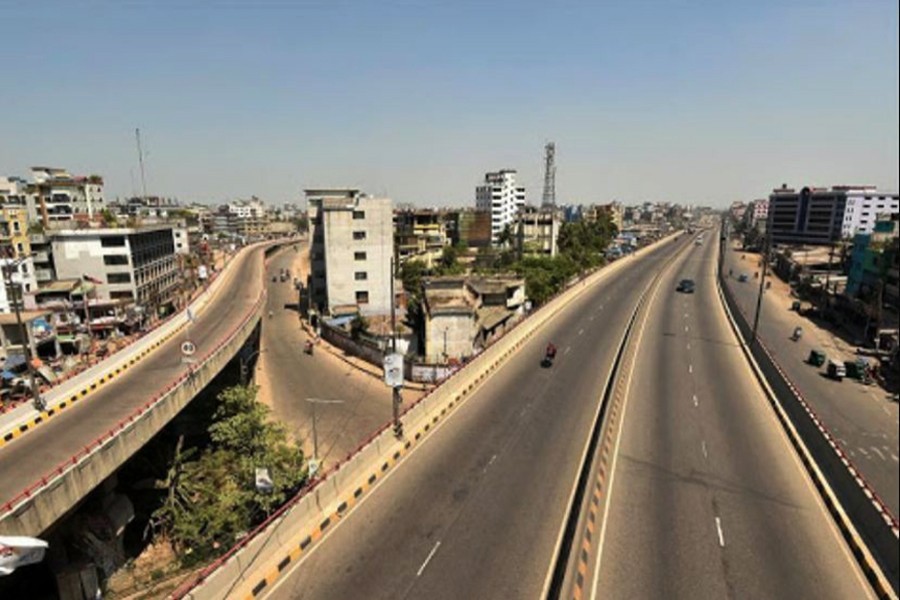The whole world is now filled with gloom and uncertainties. The US researchers'extension of the ongoing pandemic's simmering prevalence possibly by two more years adds to the widespread dreary mood. Although a few nations have relaxed their lockdowns, the restrictions are in place in many countries. Economies in global perspective are on a headlong plunge aggravated by widespread unemployment. Bangladesh is no exception. Apart from streamlining its economic topsy-turvy, the two immediate priorities which warrant focus are feeding the ultra-poor and bringing back their unemployment.
Meanwhile, isolated but highly depressing sights continue to be encountered in Dhaka. A now-common scenario has this.Night has fallen almost two hours ago. The city has never experienced spectacles like this: a line of rickshaw-pullers pedalling their vehicles slowly along deserted alleyways, stopping by houses and letting out their cries - "Help us in whatever way you can. Be kind to us. We have been compelled to come to you. We may not be able to survive without your handouts."
People feel stunned by this and other such views. They feel edgy, with premonitions overtaking them. It's because on being turned away from most of the houses, the aid-seeking voices become shrill and defiant. They seem to be unwilling to leave a house-front unless their demands are met. In the time of the festering deadly pandemic, anything which is not lodged even in the furthest recessesof people's imagination might happen. Misgivings do not go away. What if the numbers of the alms-seekers keep swelling by the day and they begin coming in their hordes?It might start occurring. Most of the people can realise that these desperate people seeking help have been left out of the relief distribution programmes being conducted in the capital.
During the prolonged shutdown enforced to keep Covid-19 at bay, acts of defiance of the order have turned rampant. It became a common spectacle in Dhaka, and elsewhere in the country. This fact speaks of a widespread tendency among people to break laws. These people cut across social divides, meaning they belong to all classes. Social observers now find themselves bracing for worse times. As they view it, days may not be far when breaking laws and civility norms will become the order of the day. The post-Covid-19 times cannot be expected to emerge completely free of the behavioural and psychological aberrations left behind by the pandemic.
A lot of urban scenarios and traits of the common citizens might seem strange lately. Some of these are feared to have caused worries among the reputably peace-loving middle class.They also are wary of the new turn of reality: the nearly menacing behaviour of the destitute classes. These sections mainly comprise day labourers, rickhaw-pullers and other low-income groups. These people are those who have lost their works or closed their petty businesses during the shutdown. The upper and lower middle-class people who have somehow pieced together their corona-hit shattered lives are found bracing fora bleak future. It is quite normal.Their fear stems from theapprehension of the bottom-rung people's increasing destitution, and the suppressed anger spiralling out of the manageable limits. In the coming days, there might emerge a distinctive class. In general, thefixed-income educated people now remain haunted by the spectre of the underprivileged classes' behavioural changes.
As an in-depth look shows, this distressingly troubling possibility doesn't elude the people who could manage to recover from the corona-time traumas. To speak briefly, a prolongedstay of the Covid-19 pandemic might unleash other unthought-of maladies on the nation. In along-term perspective, the vast rural areas surface in the mind with their endless economic woes, most of them related to the agricultural sector. The coronavirus pandemichit the villages with the same ferocity as seen in the cities.
Like on many previous occasions, a small number of people always try to abide by laws. The Covid-19 shutdown was no exception. Perhaps, it is these people who have inspired a lot of others to respect the stay-at-home order in the cities. With the monitoring and law enforcing personnel of the police, RAB and the Army continuing to persuade the city residents to stay indoors, Dhaka has been able to witness brief phases of success with the shutdown. But the enforcement forces had to give in to the sheer volume of the large numbers of unruly city residents. Thanks to a section of these people's tendency to defyrules, the Covid-19 preventive measures went awry. Defiance and nonchalance all along ruled the roost in Dhaka's densely populated areas.
The government is mulling lifting of the shutdown. They have set dates. But this very news has prompted people living in the urban areas to come out in the streets. 'Social distancing' has long been an exercise in futility. With the shutdown withdrawn, the frenzied movement of people in the capital and the large cities can be viewed in advance.The onset of 'natural herd immunity' has lately prompted increase in the number of asymptomatic coronavirus cases. The uncontrolled rush of city-bound people from villages looms like a fresh calamity in the making.The developed world is free of these dreadful scenes. But its apprehensions overthe socio-economic impacts of the lately predicted recurring pandemic waves are shared by poorer nations.
According to a lot of epidemiologists, the coronavirus scourgewill hit far-flung regions in boutsof varying degrees of intensity, before it is overpowered by vaccines. Amid its off-and-on outbreaks, thousands of more people are feared to die in the vulnerable countries across the world.Withgrim prospects in sight,the cases of thepoorer countries can be portrayed in detail. Given its messy way ofcoping with the pandemic, unwarranted impacts are feared to be experienced in a number of sectors in Bangladesh.Development experts point out the social and economic fields as thetwo highly vulnerable areas.The recovery and exit of Bangladesh from the scourgehinges on one vital factor- a resurgent economy.The others include keeping people free of post-pandemic miseries.


